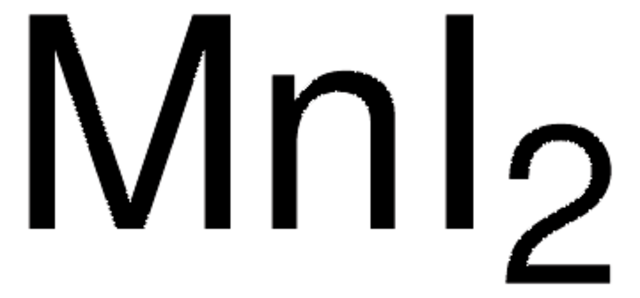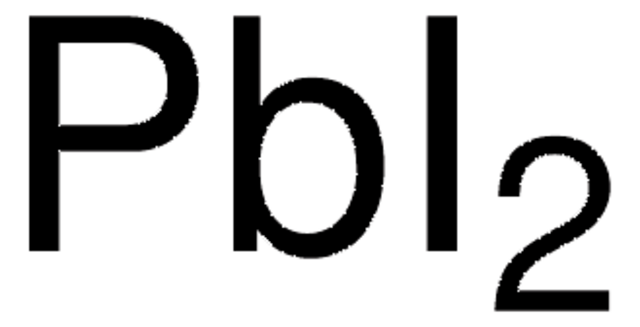230014
Zinc iodide
≥99.99% trace metals basis
Synonym(s):
Diiodozinc, Zinc diiodide
About This Item
Recommended Products
Quality Level
Assay
≥99.99% trace metals basis
form
crystalline
reaction suitability
reagent type: catalyst
core: zinc
impurities
≤100.0 ppm Trace Metal Analysis
mp
445 °C (lit.)
density
4.74 g/mL at 25 °C (lit.)
SMILES string
I[Zn]I
InChI
1S/2HI.Zn/h2*1H;/q;;+2/p-2
InChI key
UAYWVJHJZHQCIE-UHFFFAOYSA-L
Looking for similar products? Visit Product Comparison Guide
General description
Application
- An electrolyte in Zinc-iodine redox flow batteries.
- An additive to prepare air-stable cationic lead perovskite films. The addition of ZnI2 enhances the film stability and photoluminescence without affecting the bandgap.
- As a precursor to prepare efficient, eco-friendly, and high color purity inkjet-printed blue InP/ZnS/ZnS quantum dot light-emitting diodes.
- A catalyst in promoting various chemical transformations, for example, in the direct synthesis of 2,3-Dihydroisoxazoles via a [3+2] cycloaddition reaction of the nitrones and terminal alkynes.
- An activator/initiator in living cationic polymerization reactions.
Signal Word
Warning
Hazard Statements
Precautionary Statements
Hazard Classifications
Aquatic Acute 1 - Aquatic Chronic 1 - Eye Irrit. 2 - Skin Irrit. 2 - STOT RE 2 Oral
Target Organs
Thyroid
Storage Class Code
13 - Non Combustible Solids
WGK
WGK 3
Flash Point(F)
Not applicable
Flash Point(C)
Not applicable
Personal Protective Equipment
Regulatory Listings
Regulatory Listings are mainly provided for chemical products. Only limited information can be provided here for non-chemical products. No entry means none of the components are listed. It is the user’s obligation to ensure the safe and legal use of the product.
PDSCL
Deleterious substance
PRTR
Class I Designated Chemical Substances
ISHL Indicated Name
Substances Subject to be Indicated Names
ISHL Notified Names
Substances Subject to be Notified Names
JAN Code
230014-250G:4548173120645
230014-BULK:
230014-25G:4548173120652
230014-VAR:
Choose from one of the most recent versions:
Certificates of Analysis (COA)
Don't see the Right Version?
If you require a particular version, you can look up a specific certificate by the Lot or Batch number.
Already Own This Product?
Find documentation for the products that you have recently purchased in the Document Library.
Customers Also Viewed
Articles
Colloidal quantum dots (CQDs) are semiconducting crystals of only a few nanometers (ca. 2–12 nm) coated with ligand/surfactant molecules to help prevent agglomeration.
Our team of scientists has experience in all areas of research including Life Science, Material Science, Chemical Synthesis, Chromatography, Analytical and many others.
Contact Technical Service











